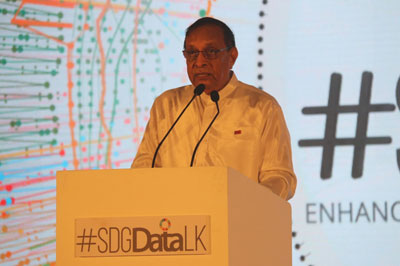First National Symposium on data for SDGs
View(s):Sri Lanka’s First National Symposium on Data for the SDGs jointly organised by the Government and UNDP was held in Colombo on Tuesday.

Parliament's Speaker Karu Jayasuriya speaking at the event.
It was inaugurated by Speaker of Parliament, Karu Jayasuriya, Deputy Speaker of Parliament and Chairman of the Parliament Select Committee for the UN 2030 Agenda for Sustainable Development, Thilanga Sumpathipala, and the UN Resident Coordinator, Simrin Singh.
The two-day symposium was a platform for enhancing the use of data towards evidence-based policy making and coordination of monitoring the progress on the SDGs in Sri Lanka, UNDP said in a media statement.
SDGs (Sustainable Development Goals) are far reaching, global goals aimed at transforming our world; a global movement to end poverty, protect the planet and ensure prosperity for all. Sri Lanka, along with 192 countries committed to this ambitious agenda by agreeing to achieve the 17 global goals. The role of data in this agenda is often downplayed. Data is the lifeblood of decision-making, without which policy makers are unable to make informed, effective and evidence-based decisions that lead to achieving the SDGs, the release said.
Highlighting the importance of data, Ms. Singh, said, “Without data, we cannot know how many people are born and at what age they die; how many men, women and children still live in poverty; how many children need educating, and how many doctors to train.”
Ten sessions were conducted during the two days by 24 esteemed local and international resource persons. The sessions covered impact and importance of data, context and challenges of SDG data in Sri Lanka, and strategy and way forward in using data for the SDGs. The discussions focused on the need for mapping baseline data in Sri Lanka, against the 244 SDG indicators, to understand where Sri Lanka currently stands in the journey towards achieving the SDGs by 2030.
Speaking at the event, Speaker Jayasuriya, stated, “For a country such as Sri Lanka, with established digital infrastructure, and 20.4 million people, gathering data should be more cohesive, and forward thinking. We should see how we can move away from the traditional methods to more technologically advanced systems that can provide real-time data that can guide policymaking in the country.”
Participants include multiple stakeholders from the Government, UN agencies, private sector, civil society organisations, academia, and data and research organisations.


